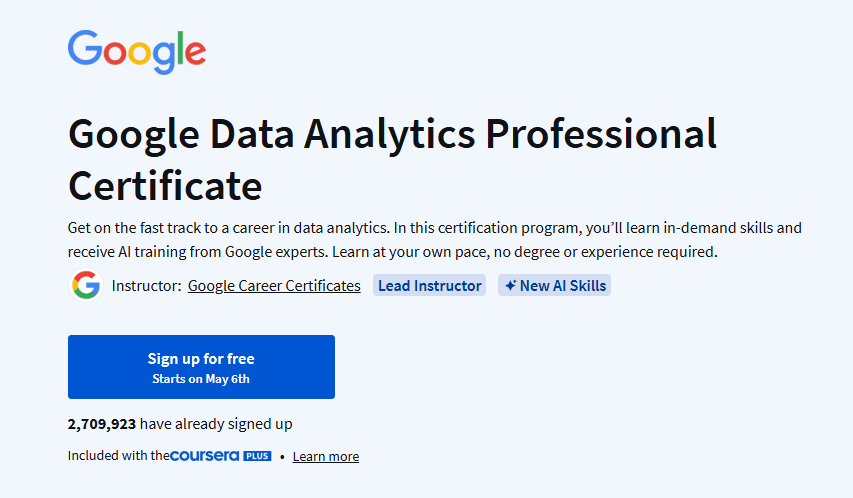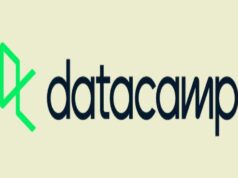Are you looking for a way to get into data analytics without needing a college degree? You may have heard of the Google Data Analytics Professional Certificate , but you’re not sure what it is or if it’s worth the investment. In this article, I’ll share everything you need to know about this certification that’s transforming careers around the world.
As someone who closely follows the trends in the technology and data analysis market, I can say that this Google certification has become a game-changer for many professionals. Let’s explore all aspects of this training together, from the content to the cost and the opportunities it can open up for you.
What is the Google Data Analytics Professional Certificate?
The Google Data Analytics Professional Certificate is a comprehensive training program developed by Google to enable individuals to become entry-level data analysts, even without prior experience in the field. This program is part of the Google Career Certificates initiative, which was created to help fill skills gaps in high-demand technology fields.
What makes this certificate so special is that it was developed by Google experts, combining technical knowledge with practical industry insights. It’s not just a theoretical course — you’ll learn practical skills that you can immediately apply to your career.
Main features of the certificate:
- 100% online program that can be completed in approximately 6 months (with 10 hours of study per week)
- No college degree or prior data analysis experience required
- Teaches essential tools like SQL, R, Spreadsheets and Tableau
- Includes over 180 hours of instruction and hands-on exercises
- Offers final project for portfolio construction
- Connect with 150+ US employer partners
“Data analysis is one of the most in-demand skills in today’s market, with average starting salaries exceeding $70,000 per year in many countries.”
Google Data Analytics Professional Certificate Content
The program is divided into 8 courses that take you from beginner level to the skills needed for an entry-level data analyst position. Let’s explore what each course covers:
Course 1: Fundamentals: Data, Data, Everywhere
This introductory course lays the foundation for your journey into data analysis:
- Understanding the role of the data analyst
- Fundamental concepts of data analysis
- Industry tools overview
- Difference between descriptive, predictive and prescriptive analytics
- Introduction to analytical thinking
Course 2: Asking Questions to Make Data-Driven Decisions
In this module you will learn:
- How to formulate effective analysis questions
- Problem-solving methodology with data
- Structuring analytical thinking
- Communication with stakeholders
- Understanding project requirements
Course 3: Preparing Data for Exploration
Here the focus is on the crucial data preparation step:
- Data cleaning techniques
- Identification and treatment of missing data
- Normalization and transformation of variables
- Data integrity check
- Documentation of preparation processes
Course 4: Data Processing for Cleaning
This course deepens technical skills:
- Learning SQL for data manipulation
- Data validation and verification
- Advanced cleaning techniques
- Combining data from multiple sources
- Data quality principles
Course 5: Analyzing Data to Answer Questions
At this point, you start applying meaningful analytics:
- Exploratory analysis techniques
- Identifying patterns and trends
- Applied descriptive statistics
- Implementing analysis in spreadsheets and SQL
- Interpreting results for insights
Course 6: Sharing Data Through the Art of Visualization
Data visualization is the focus here:
- Learning Tableau for Visualization
- Design Principles for Effective Visualization
- Creating interactive dashboards
- Storytelling with data
- Choosing the right visualization for each type of data
Course 7: Data Analysis with R Programming
This module introduces programming for analysis:
- Fundamentals of the R language
- Packages and libraries for analysis in R
- Data manipulation with R
- Visualization with ggplot2
- Statistical analysis with R
Course 8: Google Data Analytics Final Culminating Project
The program ends with a complete project:
- Application of all acquired skills
- Development of a real case analysis
- Creating a professional portfolio
- Preparing for job interviews
- Guidelines for continuing professional development
Each of these courses is designed to progressively build your skills, from fundamental concepts to advanced practical applications. The format is interactive, with videos, readings, quizzes, and hands-on projects that reinforce learning.
How much does the Google Data Analytics Professional Certificate cost?
One of the most frequently asked questions about the certificate is its cost. Let’s analyze the available options:
Payment options on Coursera:
- Monthly Subscription : Approximately $39-49 per month
- Complete package : Some promotions offer the complete package at reduced prices.
If you complete the program in 6 months with the monthly subscription, the total investment would be around $234-294 . However, if you dedicate more time to studying, you can complete it faster and reduce this cost.
Options for free or discounted access:
- Free Trial Period : Coursera offers a 7-day free trial
- Financial Aid : Available to those who cannot afford the full cost (application process required)
- Fellowships : Google and partners occasionally offer fellowships to underrepresented groups in technology.
It is important to remember that the value of the certificate should be considered an investment in your career, with the potential for significant returns.
Want to start your journey as a data analyst? Click here to access the Google Data Analytics Professional Certificate on Coursera and enjoy a 7-day free trial! ]
Google Data Analytics Professional Certificate on Coursera: How does it work?
The platform chosen by Google to host this certificate is Coursera, one of the largest online education platforms in the world. Let’s understand how this partnership works:
The Coursera Learning Experience
Coursera offers a structured and flexible learning experience:
- 24/7 access to all course content
- Mobile app to study anywhere
- Discussion forums to interact with other students
- Automated assessments with immediate feedback
- Subtitles in multiple languages (including Portuguese)
- Verifiable digital certificate upon completion
How to sign up and get started:
- Create a Coursera account
- Find the Google Data Analytics Professional Certificate
- Choose between free trial period or direct payment
- Complete the registration process
- Start right away with the first course
Recommended study schedule:
- 10 hours per week : Completion in approximately 6 months
- 15-20 hours per week : Completion in 3-4 months
- Part-time (5 hours per week) : Completion in approximately 10-12 months
Flexibility is one of the great things about this program. You can study at your own pace, adjusting your schedule to suit your availability. This allows you to continue working or studying while earning this certification.
READ ALSO:
Best Python Courses and Certifications on Coursera
Coursera Professional Certificates
Areas of Activity for IT Professionals
Google Data Analytics Professional Certificate Review and Reviews
With thousands of students having completed the program, there are many reviews and critiques available. Let’s take a look at the most frequently mentioned pros and cons:
Frequently cited positive points:
- Comprehensive curriculum covering all essential skills
- Practical content with real-world applications
- Qualified instructors with industry experience
- Portfolio projects that demonstrate competencies
- Google Brand Recognition on Resume
- Active community of students and graduates
Criticisms and limitations mentioned:
- Focuses primarily on entry-level skills (not an advanced program)
- Some people want more content about Python (which is a popular language)
- It requires self-discipline to complete, like any online course.
- Direct connection to employers may vary depending on geographic region
“While no course can guarantee a job, Google Certification consistently ranks among the best-value certifications for beginners in data analysis.”
What graduates say:
Graduates often report that the program:
- Provided a clear framework for learning complex skills
- Helped build confidence for interviews and job positions
- Provided exposure to real tools used in the industry
- Created a network of contacts with other professionals in career transition
Is the Google Data Analytics Professional Certificate worth it?
This is probably the most important question for anyone considering the program. The answer, as always, depends on your specific goals.
Who the certificate is best suited for:
- Beginners in the data field with no previous experience
- Professionals in career transition looking to enter the data analytics field
- College students looking to complement their academic education
- Business professionals looking to add analytics skills to their repertoire
- Self-learners who prefer a structured curriculum over scattered resources
Factors to consider in your decision:
- Career Objectives : The certificate is ideal for entry-level positions, not senior roles.
- Time investment : Can you dedicate at least 5-10 hours a week for a few months?
- Learning style : Do you adapt well to the online learning format?
- Budget : Does the cost fit into your current financial plan?
My analysis is that the certificate offers excellent value for the money . When compared to bootcamps ($10,000+) or college degrees ($30,000+), the cost of around $300 is very affordable for the skill set you gain.
Stop wasting time trying to learn data analytics on your own! Join the thousands of professionals who have transformed their careers with the Google Data Analytics Professional Certificate. Get started today! ]
Specific skills you will develop
Let’s dive deeper into the technical and non-technical skills you’ll develop by completing this certificate:
Technical skills:
1. Spreadsheet Analysis
- Advanced functions (VLOOKUP, statistical functions, conditionals)
- Pivot tables for exploratory analysis
- Spreadsheet views
- Automation of repetitive tasks
2. SQL for Data Analysis
- Complex queries to extract insights
- Table joins to combine data from different sources
- Aggregation functions for summarizing data
- Subqueries and CTE (Common Table Expressions)
3. Programming in R
- Basic and advanced syntax
- Data manipulation with dplyr
- Visualization with ggplot2
- Statistical analysis with specialized packages
4. Data Visualization with Tableau
- Creating interactive dashboards
- Visual storytelling with data
- Design Techniques for Effective Visualizations
- Sharing visual insights
5. Analysis Methodologies
- Exploratory data analysis (EDA)
- Applied descriptive statistics
- Cleaning and transformation techniques
- Documentation and presentation of results
Non-technical skills:
- Analytical thinking
- Structured problem solving
- Communicating technical results to non-technical audiences
- Collaboration on data projects
- Ethics in data analysis
These skills are highly transferable and valued in virtually every modern industry. The combination of technical and soft skills is what makes graduates of this program so attractive to employers.
The job market for data analysts
One of the main reasons to pursue this certification is the promising job market for data analysts. Let’s take a look at some statistics and trends:
Market Statistics:
- Demand for data analysts has grown by more than 40% in the last five years
- The average starting salary for junior data analysts is between $60,000 and $80,000 per year in developed countries.
- Over 70% of companies report difficulty finding skilled data talent
- It is estimated that there will be more than 3 million data-related jobs by 2026
Industries with the highest demand:
- Technology and software
- Finance and insurance
- Health and pharmaceuticals
- Retail and e-commerce
- Marketing and advertising
- Logistics and supply chain
Relevant job titles:
- Junior Data Analyst
- Business Analyst
- Business Intelligence Specialist
- Digital Marketing Analyst
- Operations Analyst
- Junior Data Scientist
“Data analytics is not just a career, it is a fundamental skill for the future of work in virtually every industry.”
Comparison with other data analytics certifications
To help you decide, it’s helpful to compare the Google Data Analytics Professional Certificate with other popular options:
Microsoft Certified: Data Analyst Associate
- Cost: Approximately $165 (exam only)
- Duration: Self-study + exam
- Focus: Power BI and Microsoft ecosystem
- Differential: More focused on professionals who already work with Microsoft tools
IBM Data Analyst Professional Certificate
- Cost: Approximately $39/month on Coursera
- Duration: 5-6 months (studying 5-10 hours per week)
- Focus: Python, SQL and visualization
- Differential: More emphasis on Python compared to Google
DataCamp Data Analyst Career Track
- Cost: Approximately $25-33/month
- Duration: Flexible, typically 4-6 months
- Focus: R, SQL and visualization
- Differential: Interactive platform focused on practical exercises
Data Analysis Bootcamps
- Cost: $5,000-$15,000
- Duration: 3-6 months (full-time)
- Focus: Varies, generally broader
- Differentiator: More intensive and often with real-time support
Google Certification stands out for its balance between cost, curriculum coverage, and brand recognition . While other options may delve deeper into specific tools, Google offers a solid foundation for a relatively low investment.
How to maximize the value of your certificate
Getting certified is just the beginning. To maximize your return on this investment, consider these strategies:
During the program:
- Complete all optional projects to enrich your portfolio
- Actively participate in discussion forums for networking
- Apply learning to personal side projects
- Document your progress on a blog or GitHub
- Connect with other students for collaborative learning
Upon completion:
- Create an impressive portfolio with your best projects
- Optimize your LinkedIn profile by highlighting your new skills
- Participate in data-related open-source projects
- Connect with the program’s alumni community
- Continue expanding your skills with complementary resources
“A certificate is a starting point, not a destination. The true value comes from the continued application of the skills acquired.”
Complementary resources for continued learning
To continue your development after completing the certificate, consider these resources:
Online communities:
- Kaggle : For competitions and practice datasets
- GitHub : For sharing projects and collaborating
- Stack Overflow : To solve technical doubts
- Reddit (r/datascience, r/dataanalysis) : For discussions and trends
Recommended books:
- “Storytelling with Data” by Cole Nussbaumer Knaflic
- “R for Data Science” by Hadley Wickham
- “SQL for Data Analysis” by Cathy Tanimura
- “Data Science from Scratch” by Joel Grus
Advanced courses to continue the journey:
- Specialization in Data Science
- Specific Python courses for data analysis
- Machine Learning for Data Analysts
- Advanced data visualization
Ready to transform your career? The future of data analytics awaits you! Click here to enroll in the Google Data Analytics Professional Certificate and start your journey today! ]
READ ALSO:
What Does a Support Analyst Do
What Does a Database Administrator Do
Google Data Analytics Professional Certificate FAQs
Finally, let’s address some of the most common questions about this program:
Is prior programming knowledge required?
No. The certificate is designed for beginners and teaches all the necessary skills from the very beginning. However, familiarity with computers and comfort with numbers is helpful.
Is the certificate internationally recognized?
Yes. As a Google certification, it is recognized globally. However, the specific cost may vary depending on the local market and industry.
Can I get a job with just this certificate?
Possibly. Many graduates report success in landing entry-level positions, but the certificate is most effective when combined with a strong project portfolio and interview skills.
How long does it take to complete the program?
Most students complete this in 4-6 months, studying 10 hours per week. However, you can adjust the pace to suit your schedule.
Does the certificate expire or need to be renewed?
No. Once you earn the certificate, it is yours permanently. However, it is recommended that you continue to update your skills, as the data analytics field evolves rapidly.
Is there technical support available during the program?
Yes, through Coursera’s forums where instructors and peers can help with questions. There is no one-on-one tutoring, but many support resources are available.
Can I transfer credits from this certificate toward a college degree?
Some institutions offer college credits to certificate holders, but this varies. Check with the specific universities you are interested in.
Conclusion: Take the next step in your data career
The Google Data Analytics Professional Certificate is an affordable and effective way to enter the exciting world of data analytics. With a relatively modest investment of time and money, you can gain valuable skills that are in high demand in the global marketplace.
Whether you are considering a career change, looking to enhance your current skills, or simply curious about data analysis, this program offers a structured, industry-recognized pathway.
What impresses me most about this certificate is the balance between accessibility for beginners and enough depth to prepare you for real-world positions. It’s an example of how education is evolving to meet the needs of the modern job market.
Remember : The journey to becoming a data analyst is an ongoing process of learning and growth. This certificate is just the beginning of that exciting journey.
The data revolution is happening now, and skilled professionals have never been more in demand. Don’t get left behind! Start your career transformation today with the Google Data Analytics Professional Certificate and open doors to global opportunities in the fastest-growing field of the digital economy !












